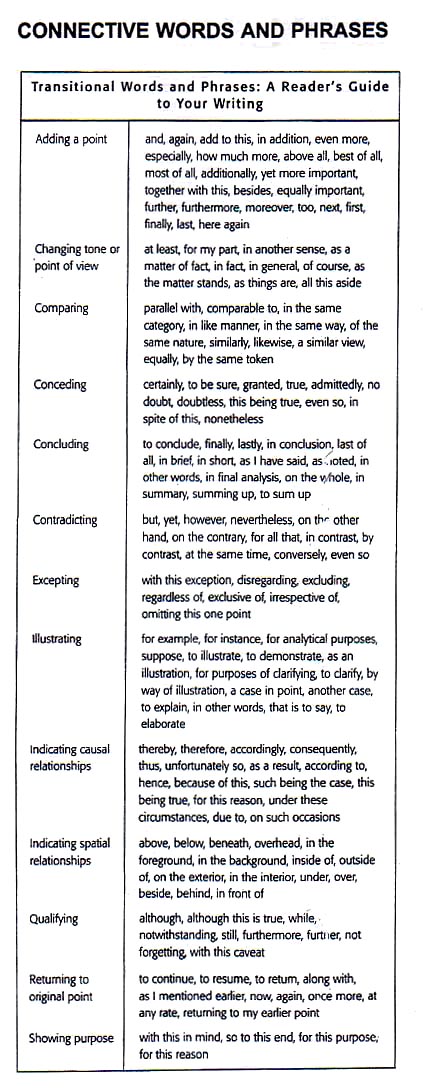

Formal and Informal
| instead of: | use: |
| by means of for the purpose of having regard to in spite of the fact that in the case of something happening in the course of in the event of prior to shall take steps to |
by, through, with for concerning although if something happens during if before shall |
| in order to continue so as to continue with a view to continuing with the object that we might continue |
to continue with the |
When 'regard to', 'with reference to' etc. is IN THE MIDDLE of the sentence, these expressions should be changed as follows: We discussed the details... |
|
| in relation to the proposal on the question of development with reference to with regard to |
regarding the proposal concerning the development about |
Exercises
Students' Frustrations with a Web-Based Distance Education Course
(1) Windschitl (1998) notes, research on the use of the World
Wide Web (WWW) lacks disciplined scholarly articles. "The vast majority
of published work is description of technology implementation in classrooms"
(p. 28) or reflection of what has been done in distance education. (2) is because
the WWW is relatively young and is still in a testing stage, not an evaluation
stage. (3), the lack of disciplined scholarly articles characterizes the field
of Computer-Mediated Communication (CMC) as a whole [2]. Romizowski and Mason
(1996: p. 442) claim that "only some 10% to 15%" of the articles published
about CMC by 1991 were research studies. (4), they note that little qualitative
research based on observation and interviewing in CMC has been conducted. Windschitl
(5) suggests that qualitative studies capture unique phenomena about WWW use.
(6) the research literature on the use of WWW is short of analytical studies
(7) qualitative studies.
(8), he suggests, (9) improve the situation a number of steps need to be put
in place. (10), researchers should begin thinking about the WWW as a valid educational
platform, and (11) much more emphasis must be placed on the use of corpora and
statistical measurements (12) researchers do not need to become mathematicians.
(13), as Windschitl stresses this will take time, and the WWW itself is still
in an early stage of evolution.
Keys
As Windschitl (1998) notes, research on
the use of the World Wide Web (WWW) lacks disciplined scholarly articles. "The
vast majority of published work is description of technology implementation
in classrooms" (p. 28) or reflection of what has been done in distance
education. One reason for this is because the WWW is relatively
young and is still in a testing stage, not an evaluation stage. Indeed,
the lack of disciplined scholarly articles characterizes the field of Computer-Mediated
Communication (CMC) as a whole [2]. Romizowski and Mason (1996: p. 442) claim
that "only some 10% to 15%" of the articles published about CMC by
1991 were research studies. Moreover, they note that little
qualitative research based on observation and interviewing in CMC has been conducted.
Windschitl also suggests that qualitative studies capture unique
phenomena about WWW use. Yet the research literature on the
use of WWW is short of analytical studies as well as qualitative
studies (Burge, 1994; McIssac and Gunawardena, 1996).
Consequently, he suggests, in order to improve
the situation a number of steps need to be put in place. Firstly,
researchers should begin thinking about the WWW as a valid educational platform,
and secondly much more emphasis must be placed on the use of
corpora and statistical measurements - although researchers
do not need to become mathematicians. Of course, as Windschitl
stresses this will take time, and the WWW itself is still in an early stage
of evolution.
Add as many linking words (and others) to make this text cohesive.
The butler announced tea.
The day was cool. The sky was cloudy. The garden was nice. The flowers were
pretty. Marion complimented Lady Buxley. Ronald talked with Marion.
Tea time was over.
Everyone went to the parlour.
The cook went to the kitchen. Maggie prepared dinner.
Dr. Hume asked Edward to play tennis. Edward agreed. Lord Edward went to the
tennis court with Dr. Hume. They played tennis. Dr. Hume was the good player.
Edward played tennis well.
The butler announced dinner.
Dr. Bartholemew Hume stopped playing tennis.
Everyone went into the dining room. Everyone set down. The butler served the
food. Supper started.
Marion talked with Florence. Florence argued with Marion. Marion said that Florence
was idiotic. Florence talked with Lady Buxley.
Supper was over. The men went to the parlour. The men smoked smelly cigars.
The men drank sherry. The women went to the drawing room. The women went to
the drawing room. The women gossiping drank coffee.
Everyone went to the parlour. Marion talked with Jane.
James went back to the library. James read a good paperback. Edward asked Ronald
to play tennis. Ronald agreed. They played tennis.
John suggested a game of bridge. Lady Buxley agreed. Dr. Bartholemey Hume agreed.
Jane agreed. They played bridge.
The servants went to bed. Everyone went to bed.